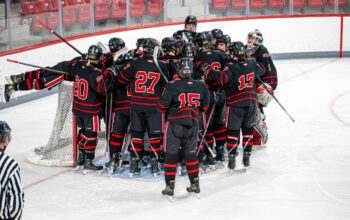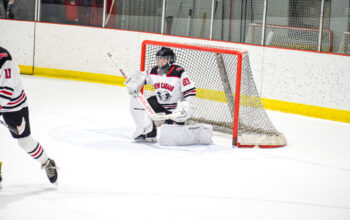
Molly Keshin, Reporter
@mollykCourant
Just a few weeks ago, Rich Bulan was wrapped up in a winter jacket and boots, cautiously stepping across

the rink to coach the girls ice hockey team in the early hours of the morning. In March, Mr. Bulan exchanged his winter items for shorts and sunglasses as he stood on the softball diamond. For Mr. Bulan, this change of pace and temperature is one of the many aspects of being a multi-sport coach.
Mr. Bulan, as well as many other multi-sport coaches at NCHS, has the opportunity to prepare, lead and build relationships with students throughout the school year due to their involvement in various sports. Coaches like Mr. Bulan don’t mind the additional work that comes with managing more than one sports program. “Personally, I look forward to it so it doesn’t bother me. I honestly can’t wait to go from one season to the next,” Mr. Bulan said. “I’ve been coaching for so long that I still haven’t gotten tired of it yet because it’s so much fun.”

Girls varsity volleyball and basketball and junior varsity lacrosse coach Kim Palmer enjoys multi-sport coaching because of the inherent variety and experience in each sport. “I think in order to be able to coach three sports, you have to be passionate about athletics, passionate about competition and certainly passionate about each of the sports in order to be fully committed to each season,” Ms. Palmer said. “But it’s something that I really appreciate because of that. Getting a chance to see all the kids and be involved in different situations throughout the school year makes it even better.”
Junior varsity field hockey and varsity gymnastics coach Michelle Tomaselli agreed that one perk of being a multi-sport coach is forming distinct relationships with the student athletes. “I find myself being more understanding

towards my gymnasts when it comes to pain, because there is a lot of pain no matter what you do, so you have to have more of a caring side to your coaching style,” Ms. Tomaselli said. “When a girl does an amazing routine, you just want to throw your arms around her and congratulate her. With field hockey it’s the same feeling, but the game goes on and you can’t run up onto the field to give your girls a hug. It’s a different atmosphere.”
While the coaches cherish the bonds they create with students, the athletes who may have the same coach for multiple seasons also recognize the importance of the coach-player relationship. Softball player sophomore Molly Rochlin has only known Mr. Bulan for one year but already appreciates his investment in his players. “It’s pretty clear that he tries really hard to interact with the players with both hockey and softball, because when you see him in the hallway he’ll go out of his way to say something to you,” Molly

said. “He doesn’t do anything for himself, he does everything for the players and the team. Knowing that he cares makes it that much easier to improve.”
Sophomore Erica Smith, who plays all three of the sports that Ms. Palmer coaches, said that while she is more comfortable with her coach, she feels more pressure to avoid continuing mistakes from previous seasons. “In a sense you’re not really afraid to make a mistake since you already know the coach and they already know who you are as an athlete,” Erica said. “It’s harder if you carry over relationships from a past season sport because the coaching staffs and dynamics for each sport are different, so you try to keep each sport to itself and take each season a new way.”
Despite the benefits of multi-sport coaching, Mr. Bulan feels that there are negative aspects of having the additional responsibility, especially when transitioning between different sports. “I think my relationships are little more in-depth with the hockey girls because I’m the head coach, and I’m doing more with helping girls look for colleges, and trying to find things that the girls may want to do to take it to the next level,” Mr. Bulan said. “Preparing for softball is more like getting ready to be a supportive player and do whatever the head coach needs done. You throw your two cents in every once in a while and hope that you’re giving a good suggestion and helping the team.”
Although there are numerous differences between the sports that Ms. Palmer coaches, she strives to maintain her coaching style and mentality. “It’s important, as a coach, that you create your own philosophy,” Ms. Palmer said. “For me, I think that you have to maintain a positive attitude no matter what sport you’re coaching, but you can’t stay at one level. You have to, depending on the situation, figure out what motivates kids, what your potential is, and how you approach those things plays a factor into your

attitude.”
Although multi-sport coaching requires increased time and effort, coaches agreed that the personal results are worth the extra work. “Coaching is a passion I have that makes me extremely happy,” Ms. Tomaselli said. “When I am having a bad day, I look forward to going to practices and games because I get to see how the athletes improve with every day. Knowing that they want to develop as athletes and as people is what makes coaching so amazing.”



